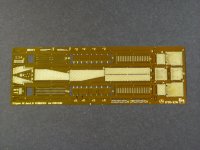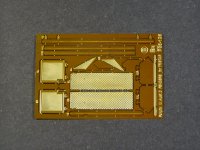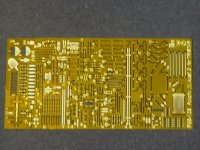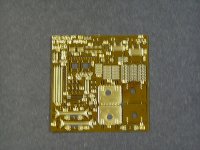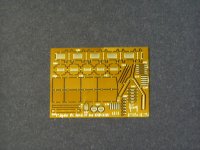Parts's 1/35 Panzer IV ausf. D (TriStar) Fender
/ Detail PE Set P35-126 / P35-125
|
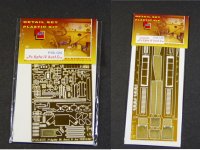 |
The first set consists of 3 photo-etched frets, one 2 5/8" x 4
3/4", one 2 1/2" x 2 1/2" and one 1 3/4" x 2 1/2".
The kit contains parts to detail the exterior of the tank, and selected
interior structures, such as hatch interiors and the commander's cupola
periscope frames. Part numbers on sheet "A" go up to 103, with
18 numbers on fret "B", and numbers F-1 thru F-40 on fret "C".
However, the total parts count is considerably higher because many part
numbers represent multiple items. For example, parts #103, which are tiny
hex bolt heads, actually total 60 items.
The level of detail on these parts approaches the limits of sight and
sanity. Upon the closest inspection, screw heads with slots are visible,
total diameter appoximately .012". The slots are so finely etched
that I am unsure if they will remain visible under even one coat of paint.
Different surface textures are evident throughout the three frets, as
well as mutiple levels of etching. The bending lines are fine and cleanly
etched, and the frets appear to be perfectly indexed, with no level separation
at the edges. Many items are composed of multiple parts. The periscope
frames consist of 5 parts each, while the turret side hatches contain
no less than 15 components. The distance marker on the rear fender is
a stack of 15 parts.
The fun continues with set #P35-126, the fender set. Two frets are included
in this set, one 2 1/2" x 7 1/4", the other measuring 2 1/2"
x 3 1/2". The long fret contains the under frames for the fenders,
separate tread sections (5 on each side), braces, front mud flap, and
other assorted bits. The smaller fret has two big tread sections, the
rear mudguard pieces, and parts to remake the rear hull joint flange.
Directions are given for making wire hinge pins and for winding springs
for the mud flaps. Part numbers go up to 31, but again, many are multiples,
with dozens of screw and bolt heads to install. This set overlaps P35-125
slightly, as the engine air intake flaps and their wingnut retainers are
included. As with the previous set, the brass is thin, very cleanly etched,
and shows various surface finishes. The assembly drawings are crisply
rendered, with all parts clearly labeled. Due to the number of parts making
up each fender, it may be a good idea to cut out and test fit the tread
plate portions onto the sub-frame before bending to get a feel for where
each section goes. Assembly could be done by glueing or soldering, as
no suggestion is given in the instructions. Due to the way in which the
fender sections mount onto the subframe, it appears that they could be
soldered from the bottom, thereby lessening the chance of marring the
upper surface. Soldering also gives a much stronger and more durable joint
than glueing, and is a skill well worth mastering.
Conclusion
I did not have a TriStar kit to look at in order to compare what is
being replaced, nor do I know how well this set would fit other Panzer
IV kits. I do know the sets are extensive, beautifully etched, and abound
with delicate detail. I would definitely recommend these sets to modellers
experienced in bending and installing photo-etched accessories. Not for
beginners. My sincere thanks to Roll
Models for the review sets. Happy modelling.
|
|

